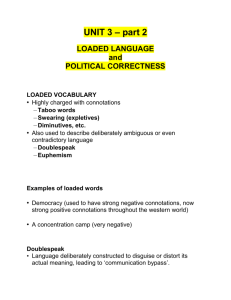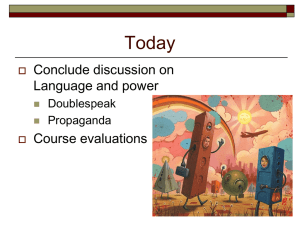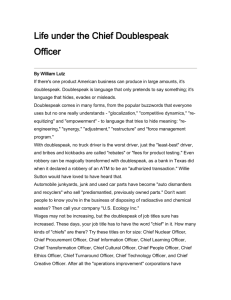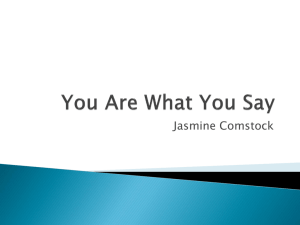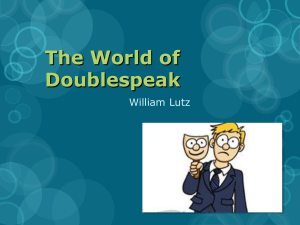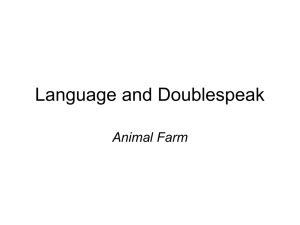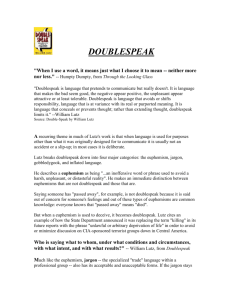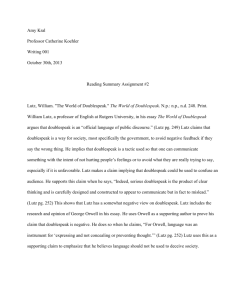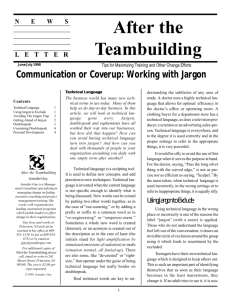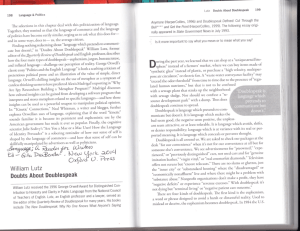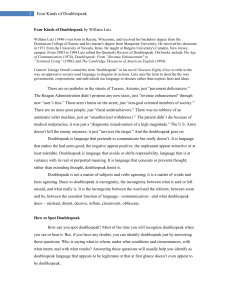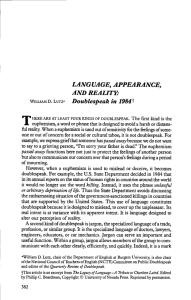File
advertisement
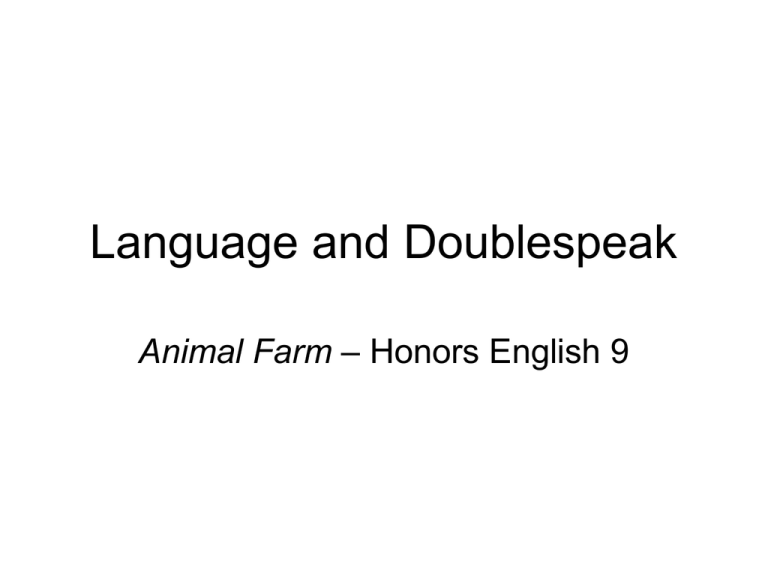
Language and Doublespeak Animal Farm – Honors English 9 “The language we use to communicate with one another is like a knife. In the hands of a careful and skilled surgeon, a knife can work to do great good. But in the hands of a careless or ignorant person, a knife can cause great harm. Exactly as it is with our words.” - Unknown Denotation • the explicit or direct meaning or set of meanings of a word or expression; • the dictionary meaning. • Example: – Snake - a limbless reptile with a long, scaly body Connotation • an implied meaning of a word; • ideas or feelings suggested by the word (negative or positive). • Example: – Snake: an evil, bad, or sneaky person Note: Words that have the same denotative meaning can have much different connotative meanings. The connotation of a word can tell you a lot about what the speaker of the word means by it. Not all words have connotative meanings. It’s a Zoo Out There! The English language has appropriated the names of numerous animals for common verbs, adjectives, and nouns with very different meanings. What are the denotations and the connotations of the following? to pig out to rat on someone to horse around to crow about something Can you complete these clichés? • Work like a … • Swim like a … • Sly as a … • Wise as an … • Busy as a … Animals in Animal Farm What characteristics are shown in the types of animals used for each character? Napoleon, Snowball, Squealer, and Old Major the pigs The dogs Boxer the horse Mollie the horse Benjamin the donkey Moses the raven The Power of Language Political language…is designed to make lies sound truthful and murder respectable and to give an appearance of solidarity to pure wind. -George Orwell, “Politics and the English Language” Doublespeak • We hear and read doublespeak every day, but what, exactly, is doublespeak? • Webster's dictionary defines doublespeak with these words: evasive, ambiguous, highflown language intended to deceive or confuse. • Term was coined in 1974 Specific Attributes of Doublespeak (Lutz) • • • • • • • • • • misleads distorts reality pretends to communicate makes the bad seem good avoids or shifts responsibility makes the negative appear positive creates a false verbal map of the world limits, conceals, corrupts, and prevents thought makes the unpleasant appear attractive/tolerable creates absurdity between reality and what is said or not said Types of Doublespeak • Euphemism – words that attempt to soften, hide, or distort reality by putting the thing described into a better light, making the object it describes sound less frightening, less threatening, or less offensive – The word euphemism is derived from the Greek word euphemos, meaning “to use a good word for an evil or unfavorable word.” Examples of Euphemisms • Look at the word on your index card. • Your index card has either a word/thing or a euphemism of a word/thing. • Find your match and decide which one is the word/thing and which one is the euphemism. Types of Doublespeak • Jargon – specialized language used by a particular professional, trade, or hobby group; – specialized language; – can be overly-complex terms used to impress others – often meaningless to outsiders Examples of Jargon Medical Education Military Texting Laceration Aspirate Hematoma AP ESOL Warm-up POW MIA Army Brat LOL BTW TTYL Types of Doublespeak • Gobbledygook – many long, sophisticated words (think "gobs of words") – used in long, complicated sentences to confuse the audience and hide the real issue of the discourse Examples of Gobbledygook Gobbledygook: All transactions effected pursuant to this instrument shall be effected for the account and risk and in the name of the undersigned; and the undersigned hereby agrees to underwrite and hold you harmless from, and to pay you promptly on demand, any and all losses arising there from or any debit balance due thereon. English: You'll be responsible for anything you owe on your account. Examples of Gobbledygook Gobbledygook: 'Twas the nocturnal segment of the period preceding the annual Yuletide celebration, and throughout our place of residence, kinetic activity was not in evidence among the possessors of this potential, including that species of domestic rodent known as Mus musculus. English: 'Twas the night before Christmas, when all through the house, not a creature was stirring, not even a mouse; Types of Doublespeak • Inflated Language – puffed-up, important-sounding words used to give commonplace things and events an elevated, glowing appearance Examples of Inflated Language • negative patient care outcome: – the patient died • mental activity at the margins: – insanity • reutilization marketing yard: – junkyard Negative Impacts • Doublespeak Corrupts Thought – We use language to think, to make decisions, to express our thoughts and feelings on issues. Then, we act as a result of processing information, which we can only do by using language. So, the language we hear and use in our everyday lives influences us and helps shape our opinions to a greater degree than we probably realize. If the language we hear and read is corrupt and misleading, it will corrupt and mislead our thought processes. Negative Impacts • Doublespeak Destroys Communication – Language affects how we think and act, it also affects our ability to communicate with other people. To discuss issues intelligently, we must use the language that we all agree on. If some people or groups use their own language of doublespeak that hides the truth and misleads the receivers of the message, then open, honest discussion cannot take place. In other words, we cannot truly relate with others. Negative Impacts • Doublespeak Erodes Trust – When we hear doublespeak from all sides-government, education, the advertising industry, the media--we begin to be cynical and distrustful toward these institutions. This attitude of distrust then adds yet another barrier to true, open communication. Identify examples of doublespeak from the novel. What impact does doublespeak have on the novel?
